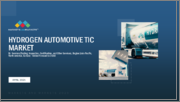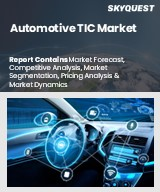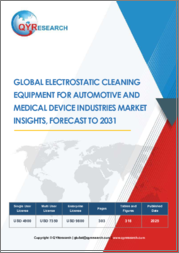
|
시장보고서
상품코드
1719528
수소차 시험, 검증 및 인증(TIC) 시장 : 서비스별, 차량 유형별, 지역별 - 예측(-2030년)Hydrogen Automotive Testing, Inspection, and Certification (TIC) Market by Service (Testing, Certification, Inspection, and Other Services), Region (Asia Pacific, North America, Europe) - Forecast to 2030 |
||||||
수소차 시험, 검증 및 인증(TIC) 시장 규모는 2024년 1,830만 달러에서 2030년에는 3,580만 달러에 달하고, 예측 기간 동안 11.8%의 연평균 복합 성장률(CAGR)을 보일 것으로 예측됩니다.
수소 연료전지 자동차의 보급 확대, 엄격한 안전 및 배기가스 규제, 수소 인프라에 대한 투자 확대가 시장을 주도하고 있습니다. 정부의 장려책, 환경 문제에 대한 관심 증가, 수소 기술의 발전은 품질 보증에 대한 수요를 증가시키고 있습니다. 또한, 세계 표준화 노력과 수소 충전 네트워크의 확대는 TIC 서비스의 필요성을 가속화하고 있습니다.
| 조사 범위 | |
|---|---|
| 조사 대상 연도 | 2020-2030년 |
| 기준 연도 | 2023년 |
| 예측 기간 | 2024-2030년 |
| 검토 단위 | 금액(100만 달러/10억 달러) |
| 부문 | 서비스별, 차종별, 지역별, 지역별 |
| 대상 지역 | 북미, 유럽, 아시아태평양 |
서비스별로 수소차 시험, 검증 및 인증(TIC) 시장은 시험, 검사, 인증으로 구분됩니다. 검사 분야는 수소차 시험, 검증 및 인증(TIC) 시장에서 두 번째로 큰 분야로 예측되고 있습니다. 이러한 성장의 원동력은 수소차와 인프라의 전체 수명주기 동안 무결성, 안전성, 성능을 보장해야 할 필요성이 증가하고 있기 때문입니다. 수소차는 고압 시스템에서 작동하고 연료전지, 탱크, 파이프라인과 같은 복잡한 부품을 포함하고 있기 때문에 마모, 부식 및 잠재적 고장을 감지하기 위해 정기적인 검사가 필수적입니다. 각 지역의 규제 기관은 보다 엄격한 안전 규정을 시행하고 있으며, 인증 및 규정 준수를 위해 정기적인 검사를 의무화하고 있습니다. 또한, 수소 충전소의 급속한 확산과 수소 연료전지 차량 증가로 인해 현장 및 운영 중인 검사 솔루션에 대한 수요가 증가하고 있습니다. 이러한 요인들이 종합적으로 수소차 TIC 생태계에서 검사 서비스의 확장을 촉진하고 있습니다.
수소차 시험, 검증 및 인증(TIC) 시장은 차종별로 승용차, 버스, 소형상용차, 중형상용차, 대형상용차, 내연기관 수소차 등 5가지로 구분됩니다. 승용차, 버스, 소형상용차, 중형상용차, 대형상용차, ICE 수소차 등 5개 카테고리로 분류됩니다. 이러한 성장의 원동력은 무공해 대중교통에 대한 정부 지원 증가와 지속가능한 도시 모빌리티에 대한 투자 증가입니다. 수소버스는 배터리 전기버스보다 항속거리가 길고 연료 보급이 빠르기 때문에 도시 간 노선이나 고빈도 노선에 적합합니다. 특히 유럽과 아시아의 일부 국가에서는 청정 에너지 전환 전략의 일환으로 수소버스를 도입하고 있습니다. 또한, 규제 준수와 운행 안전을 보장하기 위해 연료전지 시스템, 저장 탱크, 안전 프로토콜에 대한 엄격한 테스트, 검사 및 인증의 필요성이 증가하고 있으며, 이는 이 부문에서 TIC 서비스에 대한 수요를 더욱 증가시키고 있습니다.
아시아태평양은 수소차 시험, 검증 및 인증(TIC) 시장에서 두 번째로 빠르게 성장하는 지역이 될 것으로 예상되며, 정부의 강력한 이니셔티브, 수소 인프라 확대, 수소차 보급 증가 등이 그 요인으로 작용할 것으로 보입니다. 일본, 한국, 중국과 같은 국가들은 국가 로드맵, 보조금, 수소 충전소 및 연료전지 차량 보급을 포함한 인프라 개발을 통해 수소 모빌리티에 많은 투자를 하고 있습니다. 일본과 한국은 수소 연료전지 기술의 세계적인 선구자입니다. 중국은 특히 물류 및 대중교통 분야에서 수소 상용차 생산과 보급을 빠르게 확대하고 있습니다. 에너지 안보와 배출가스 감축을 중시하는 이 지역의 태도는 수소 도입의 광범위한 추진력과 일치합니다. 또한, 아시아태평양에는 강력한 자동차 제조거점이 있어 기술 혁신과 다양한 차종에 수소 시스템 통합을 촉진하고 있습니다. 이에 따라 수소차 생태계 전반의 안전, 성능 및 규제 준수를 보장하기 위해 신뢰할 수 있는 시험, 검사 및 인증 서비스에 대한 요구가 증가하고 있습니다.
이 보고서는 수소차 시험, 검증 및 인증(TIC) 시장을 다양한 지역, 차량 유형별, 서비스별로 정의, 설명, 예측했습니다. 또한, 시장의 상세한 정성적 및 정량적 분석을 제공합니다. 주요 시장 성장 촉진요인, 저해요인, 기회 및 과제를 종합적으로 검토하고 있습니다. 또한, 시장의 다양한 중요한 측면도 다루고 있습니다. 여기에는 경쟁 구도, 시장 역학, 금액 기준 시장 추정치, 수소 자동차 시험, 검사 및 인증(TIC) 시장의 미래 동향에 대한 분석이 포함됩니다.
목차
제1장 서론
제2장 조사 방법
제3장 주요 요약
제4장 시장 개요
- 시장 역학
- 수소 운송 밸류체인
- 생태계 분석
- 수소 자동차 부품 수명주기 평가
- 규제기관
- 각국 정부가 채택한 전략, 계획, 정책
- TIC 참여 기업을 위한 테스트 시설
- 주요 시장 진출기업에 있어서 TIC 시장의 잠재성과 과제
제5장 수소차 TIC 시장
- 서비스별
제6장 수소차 TIC 시장
- 지역별
- 북미, 서비스별
- 아시아태평양, 서비스별
- 유럽, 서비스별
제7장 경쟁 구도
- 경쟁 벤치마킹
- 서비스 포트폴리오 비교
- 공공 부문 전망
- 기업 평가 매트릭스
제8장 기업 개요
- HYDROGEN AUTOMOTIVE TIC PLAYERS
- AUTO ENGINEERING COMPANIES
- HYDROGEN VEHICLE OEMS
제9장 부록
LSH 25.05.22The hydrogen automotive testing, inspection, and certification (TIC) market is estimated to reach USD 35.8 million by 2030 from an estimated value of USD 18.3 million in 2024, at a CAGR of 11.8% during the forecast period. The market is driven by increasing adoption of hydrogen fuel cell vehicles, stringent safety and emission regulations, and rising investments in hydrogen infrastructure. Government incentives, growing environmental concerns, and advancements in hydrogen technology are boosting demand for quality assurance. Additionally, global standardization efforts and the expansion of hydrogen refueling networks are accelerating the need for TIC services.
| Scope of the Report | |
|---|---|
| Years Considered for the Study | 2020-2030 |
| Base Year | 2023 |
| Forecast Period | 2024-2030 |
| Units Considered | Value (USD Million/Billion) |
| Segments | Service and Region |
| Regions covered | North America, Europe, and Asia Pacific |
"Inspection segment is expected to remain the second-largest, by service."
Based on service, the hydrogen automotive testing, inspection, and certification (TIC) market has been segmented into testing, inspection, and certification. The inspection segment is projected to be the second-largest segment in the hydrogen automotive testing, inspection, and certification (TIC) market. This growth is driven by the increasing need to ensure the integrity, safety, and performance of hydrogen-powered vehicles and infrastructure throughout their lifecycle. As hydrogen vehicles operate under high-pressure systems and involve complex components such as fuel cells, tanks, and pipelines, regular inspection is critical to detect wear, corrosion, or potential failures. Regulatory bodies across regions are implementing stricter safety mandates, requiring routine inspection for certification and compliance. Moreover, the rapid deployment of hydrogen refueling stations and the growing production of hydrogen-powered fleets have increased the demand for on-site and in-service inspection solutions. These factors collectively drive the expansion of inspection services within the hydrogen automotive TIC ecosystem.
"Buses: The second-largest segment of the hydrogen automotive testing, inspection and certification (TIC) market, by vehicle type."
By vehicle type, the hydrogen automotive testing, inspection, and certification (TIC) market has been segmented into five categories: passenger cars, buses, light commercial vehicles, medium duty vehicles, heavy duty vehicles, and ICE hydrogen vehicles. The segment, buses, is expected to capture the second-largest share of the market by vehicle type. This growth is driven by increasing government support for zero-emission public transportation and rising investments in sustainable urban mobility. Hydrogen-powered buses offer longer range and faster refueling than battery-electric counterparts, making them ideal for intercity and high-frequency routes. Several countries, particularly in Europe and Asia, are deploying hydrogen buses as part of their clean energy transition strategies. Additionally, the need for rigorous testing, inspection, and certification of fuel cell systems, storage tanks, and safety protocols is growing to ensure regulatory compliance and operational safety, further boosting TIC service demand in this segment.
"Asia Pacific is expected to be the second-fastest-growing region in the hydrogen automotive testing, inspection, and certification (TIC) market."
Asia Pacific is expected to be the second-fastest-growing region in the hydrogen automotive testing, inspection, and certification (TIC) market, driven by strong government initiatives, expanding hydrogen infrastructure, and increasing deployment of hydrogen-powered vehicles. Countries like Japan, South Korea, and China invest heavily in hydrogen mobility through national roadmaps, subsidies, and infrastructure development, including the rollout of hydrogen refueling stations and fuel cell vehicle fleets. Japan and South Korea are global pioneers in hydrogen fuel cell technologies. China is rapidly scaling up its production and adoption of hydrogen commercial vehicles, particularly in logistics and public transportation. The region's focus on energy security and emission reduction aligns with the broader push for hydrogen adoption. Additionally, Asia Pacific has a strong automotive manufacturing base, fostering innovation and the integration of hydrogen systems into various vehicle types. As a result, there is a rising need for reliable testing, inspection, and certification services to ensure safety, performance, and regulatory compliance across the hydrogen automotive ecosystem.
Breakdown of Primaries:
In-depth interviews have been conducted with various key industry participants, subject-matter experts, C-level executives of key market players, and industry consultants, among other experts, to obtain and verify critical qualitative and quantitative information, as well as to assess future market prospects. The distribution of primary interviews is as follows:
By Company Type: Tier 1 - 65%, Tier 2 - 24%, and Tier 3 - 11%
By Designation: C-Level Executives - 30%, Managers - 25%, and Others - 45%
By Region: North America - 21%, Europe - 25%, and Asia Pacific - 54%
Note: Others include product engineers, product specialists, and engineering leads.
Note: The tiers of the companies are defined based on their total revenues as of 2023. Tier 1: > USD 1 billion, Tier 2: From USD 500 million to USD 1 billion, and Tier 3: < USD 500 million
The hydrogen automotive testing, inspection, and certification (TIC) market is dominated by a few major players with a wide regional presence. The leading players are TUV SUD (Germany), UL LLC (US), Applus+ (Spain), TUV Rheinland (Germany), Kiwa (Netherlands), Intertek Group plc (UK), DEKRA IN (Germany), Societe Generale de Surveillance (SGS) SA (Switzerland), Southwest Research Institute (SwRI) (US), and Apave (France).
Research Coverage:
The report defines, describes, and forecasts the hydrogen automotive testing, inspection, and certification (TIC) market by vehicle type and service for various regions. It also offers a detailed qualitative and quantitative analysis of the market. The report provides a comprehensive review of the major market drivers, restraints, opportunities, and challenges. It also covers various important aspects of the market. These include an analysis of the competitive landscape, market dynamics, market estimates in terms of value, and future trends in the hydrogen automotive testing, inspection, and certification (TIC) market.
Key Benefits of Buying the Report
- The hydrogen automotive testing, inspection, and certification (TIC) market is influenced by the accelerating shift toward clean mobility, stringent environmental regulations, and the rapid deployment of hydrogen fuel cell vehicles across various transportation sectors. Growing investments in hydrogen infrastructure, coupled with government incentives for zero-emission vehicles, are propelling the need for rigorous testing, inspection, and certification services. As automotive manufacturers scale up hydrogen vehicle production, ensuring safety, performance, and compliance with international standards becomes critical. The expansion of hydrogen refueling networks, technological advancements in fuel cell systems, and the need for lifecycle quality assurance further fuel market growth.
- Product Development/Innovation: The hydrogen automotive testing, inspection, and certification (TIC) market is focused on enhancing safety, accuracy, and efficiency in testing, inspection, and certification processes. Companies invest in advanced diagnostic tools, real-time monitoring systems, and automated testing technologies to meet evolving regulatory standards. Innovations include non-destructive testing methods for high-pressure hydrogen components and digital platforms for compliance tracking. The integration of AI and IoT into TIC services is improving data-driven decision-making. These advancements support the growing complexity of hydrogen-powered vehicles and infrastructure, ensuring reliability and accelerating global adoption of hydrogen mobility solutions..
- Market Development: Hyundai Motor Company unveiled its new XCIENT Fuel Cell tractor, a commercialized Class 8 6x4 fuel cell electric model, for the North American commercial vehicle market at the Advanced Clean Transportation (ACT) Expo.
- Market Diversification: Nikola Corporation, a global company in zero-emissions transportation, and E. ON SE, an energy supply and infrastructure solution provider, signed an agreement with The Richter Group, a leading provider of individual logistics services, to decarbonize Richter Group's vehicle fleet by supplying hydrogen-electric trucks, the necessary green hydrogen, and the refueling infrastructure.
- Competitive Assessment: Assessment of rankings of some of the key players, including TUV SUD (Germany), UL LLC (US), Applus+ (Spain), TUV Rheinland (Germany), Kiwa (Netherlands), Intertek Group plc (UK), DEKRA IN (Germany), Societe Generale de Surveillance (SGS) SA (Switzerland), Southwest Research Institute (SwRI) (US), and Apave (France).
TABLE OF CONTENTS
1 INTRODUCTION
2 RESEARCH METHODOLOGY
3 EXECUTIVE SUMMARY
4 MARKET OVERVIEW
- 4.1 MARKET DYNAMICS
- 4.2 HYDROGEN TRANSPORTATION VALUE CHAIN
- 4.3 ECOSYSTEM ANALYSIS
- 4.4 LIFE CYCLE ASSESSMENT OF HYDROGEN VEHICLE COMPONENT
- 4.5 REGULATORY BODIES
- 4.6 STRATEGIES, PLANS, AND POLICIES ADOPTED BY VARIOUS GOVERNMENTS
- 4.7 TESTING FACILITIES FOR TIC PLAYERS
- 4.8 MARKET POTENTIAL AND CHALLENGES IN TIC MARKET FOR KEY PLAYERS
5 HYDROGEN AUTOMOTIVE TIC MARKET
- 5.1 BY SERVICES
6 HYDROGEN AUTOMOTIVE TIC MARKET
- 6.1 BY REGION
- 6.1.1 NORTH AMERICA, BY SERVICE
- 6.1.2 ASIA PACIFIC, BY SERVICE
- 6.1.3 EUROPE, BY SERVICE
- 6.1.3.1 BY COUNTRY
7 COMPETITIVE LANDSCAPE
- 7.1 COMPETITIVE BENCHMARKING
- 7.2 SERVICE PORTFOLIO COMPARISON
- 7.3 PUBLIC SECTOR OUTLOOK
- 7.4 COMPANY EVALUATION MATRIX
8 COMPANY PROFILES
- 8.1 HYDROGEN AUTOMOTIVE TIC PLAYERS
- 8.2 AUTO ENGINEERING COMPANIES
- 8.3 HYDROGEN VEHICLE OEMS



















